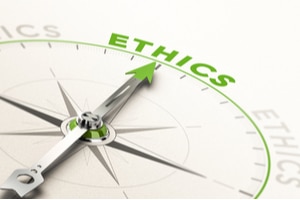Ethical and compliant behavior depends on an ethical company culture: one where employees question decisions when they conflict with organizational values and speak up when facing moral dilemmas.
While it may not be possible to encourage ethical decision making without having ethical leaders, ethical processes and the meaningful technological measures that support them must be in place for “ethical action” to be compliant.
Without repeatable, scalable, and sensible processes in place to track compliance, the actions directed towards ethical decisions may be futile. In other words, neither leadership nor processes can produce right action alone; both depend on each other.
In order for companies to create a compliant and ethical culture, company values cannot be simply plastered on walls but must be in the company’s DNA. This means that leaders at every level must encourage high standards and accountability towards justice.
But in order for these principles to become second nature, they must be incorporated into not only the attitudes of leaders but into the processes that ensure compliance. According to the Compliance Week Report on Ethics and Compliance, “There must be a top-down and bottom-up approach to ethics, by ensuring that throughout the organization there are processes in place to educate, communicate, emphasize, and embrace ethical behavior.”
If managers demand their employees to honestly evaluate whether or not there may be a conflict of interest afoot, but provide no defined process for engaging in a conflict of interest review or fail to instill trust in that process, then leadership is not enough. Leadership must be paired with strong processes and whatever technologies are needed to support them to guarantee a meaningful culture of compliance that ensures company-wide ethical decision making.
Easier processes enable stronger ethics
Is the process to request an exception to a policy easy to activate? Or is an employee spending an hour searching for the right person in the compliance department to email? Does the compliance department make it simple for a manager to report a conflict of interest? Or is a paper form that has to be faxed somewhere only to then be manually filed away?
Do new processes take months to implement with the involvement of IT and three other departments? Or can a new process be implemented by a few key stakeholders and rolled out to the business in a week?
 The best way to make ethical decisions come easily does not require rocket science. Make the processes easy. Technology is a key component for empowering organizations to provide maturity and visibility in the performance of their ethics and compliance programs.
The best way to make ethical decisions come easily does not require rocket science. Make the processes easy. Technology is a key component for empowering organizations to provide maturity and visibility in the performance of their ethics and compliance programs.
When employees see their company values reflected not only in words, but in company-wide strategies like “setting revenue targets and schedule priorities to avoid incentivizing misconduct,” those employees become more likely to act ethically. And when those employees have straightforward and easy-to-use means to track their questions around compliance or processes, then they feel empowered by their company to act ethically.
The right framework will encourage compliance
Technology can make or break an organization’s efforts to instill consistent, ethical processes that can ultimately help drive an organization’s cultural attitude towards ethics and compliance.
As one might expect, nothing works by itself. A company culture that promotes ethical decision making must be firing on all cylinders. It must take into consideration every aspect of the culture, from the people to the processes and technologies, and every aspect of the employee lifecycle, from recruiting to training to compensation and reviews.
But once the framework is set and everything is in place, ethical decision-making is certain to follow.
[bctt tweet=”Neither leadership nor processes can produce right action alone; both depend on each other.” via=”yes”]



